Antibody data
- Antibody Data
- Antigen structure
- References [1]
- Comments [0]
- Validations
- Immunohistochemistry [4]
- Other assay [2]
Submit
Validation data
Reference
Comment
Report error
- Product number
- PA5-56516 - Provider product page

- Provider
- Invitrogen Antibodies
- Product name
- PRSS23 Polyclonal Antibody
- Antibody type
- Polyclonal
- Antigen
- Recombinant protein fragment
- Description
- Immunogen sequence: PWKPTWPAYR LPVVLPQSTL NLAKPDFGAE AKLEVSSSCG PQCHKGTPLP TYEEAKQYLS YETLYANGSR TETQVGIYIL SSSGDGA Highest antigen sequence identity to the following orthologs: Mouse - 91%, Rat - 91%.
- Reactivity
- Human
- Host
- Rabbit
- Isotype
- IgG
- Vial size
- 100 μL
- Concentration
- 0.10 mg/mL
- Storage
- Store at 4°C short term. For long term storage, store at -20°C, avoiding freeze/thaw cycles.
Submitted references Exosomal microRNA-1246 from human umbilical cord mesenchymal stem cells potentiates myocardial angiogenesis in chronic heart failure.
Wang Z, Gao D, Wang S, Lin H, Wang Y, Xu W
Cell biology international 2021 Nov;45(11):2211-2225
Cell biology international 2021 Nov;45(11):2211-2225
No comments: Submit comment
Supportive validation
- Submitted by
- Invitrogen Antibodies (provider)
- Main image
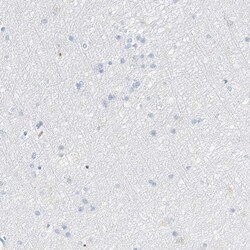
- Experimental details
- Immunohistochemical analysis of PRSS23 in human cerebral cortex using PRSS23 Polyclonal Antibody (Product # PA5-56516) shows no positivity in neuronal cells as expected.
- Submitted by
- Invitrogen Antibodies (provider)
- Main image
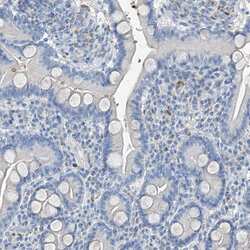
- Experimental details
- Immunohistochemical analysis of PRSS23 in human duodenum using PRSS23 Polyclonal Antibody (Product # PA5-56516) shows low expression in glandular cells as expected.
- Submitted by
- Invitrogen Antibodies (provider)
- Main image
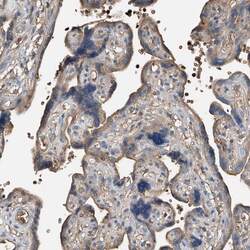
- Experimental details
- Immunohistochemical analysis of PRSS23 in human placenta using PRSS23 Polyclonal Antibody (Product # PA5-56516) shows moderate cytoplasmic positivity in trophoblastic cells.
- Submitted by
- Invitrogen Antibodies (provider)
- Main image
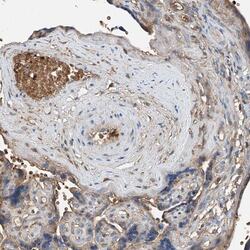
- Experimental details
- Immunohistochemical analysis of PRSS23 in human placenta using PRSS23 Polyclonal Antibody (Product # PA5-56516) shows moderate positivity in plasma.
Supportive validation
- Submitted by
- Invitrogen Antibodies (provider)
- Main image
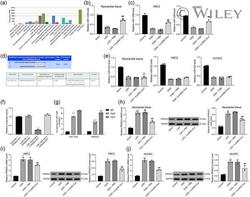
- Experimental details
- 5 Figure Exosomal miR-1246 released by hucMSCs inhibits the expression of PRSS23 to promote angiogenesis in myocardial tissues of rats or OGD-treated cells. (a) miR-1246 expression in exosomes derived from various cells analyzed on the website EvmiRNA. (b) miR-1246 expression in rat myocardial tissues assessed by RT-qPCR. (c) miR-1246 expression in H9C2 cells and HUVECs assessed by RT-qPCR. (d) Relationship between miR-1246 and PRSS23 in homo sapiens and Norway rat predicted by TargetScan and RNA22. (e) miR-532 expression in rat myocardial tissues, H9C2 cells and HUVECs assessed by RT-qPCR. (f) The binding relationship between miR-1246 and PRSS23 mRNA verified by dual-luciferase assay. (g) The relative expression of miR-1246 and PRSS23 in the complex pulled-down by antibodies against Ago2 or IgG assessed by RIP assays. (h) PRSS23 expression in rat myocardial tissues assessed by RT-qPCR and western blot analysis. (i) PRSS23 expression in H9C2 cells assessed by RT-qPCR and western blot analyses. (j) PRSS23 expression in HUVECs assessed by RT-qPCR and western blot analyses. n = 5 for each group (each dot represents the mean value of a rat or an experiment). Each reaction was run in triplicate. Data are shown as the mean +- SD from three independent experiments. Statistical significance was determined using one-way (b, c, d, h, i, and j) or two-way ANOVA (f and g) and Tukey's multiple comparison test. hucMSC, human umbilical cord mesenchymal stem cell; HUVEC, human umbilical vasc
- Submitted by
- Invitrogen Antibodies (provider)
- Main image
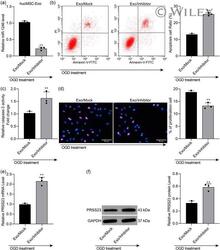
- Experimental details
- 6 Figure Reducing miR-1246 carried by hucMSC-Exo suppresses the inhibitory effect of hucMSC-Exo on cardiomyocyte apoptosis. H9C2 cells were cocultured with exosomes extracted from hucMSCs transfected with miR-1246 inhibitor (Exo/Inhibitor) or inhibitor control (Exo/Mock). (a) miR-1246 expression in hucMSC-Exo assessed by RT-qPCR. (b) The proportion of apoptosis detected by flow cytometry. (c) Caspase-3 activity in H9C2 cells evaluated by kits. (d) Proliferative activity of H9C2 cells detected by EdU staining. (e) PRSS23 mRNA expression in H9C2 cells assessed by RT-qPCR. (f) PRSS23 protein expression in H9C2 cells assessed by western blot analysis. Data are depicted as the mean +- SD from three independent experiments (each dot represents the mean value of an experiment). Each reaction was run in triplicate. Statistical significance was determined using unpaired t -test. hucMSC-Exo, human umbilical cord mesenchymal stem cell-derived exosome; miR-1246, microRNA-1246; mRNA, messenger RNA; PRSS23, serine protease 23; RT-qPCR, reverse-transcription quantitative polymerase chain reaction. ** p < .01 versus H9C2 cells cocultured with Exo/Mock
 Explore
Explore Validate
Validate Learn
Learn Immunohistochemistry
Immunohistochemistry